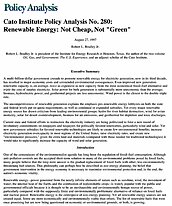A multi-billion-dollar government crusade to promote renewable energy for electricity generation, now in its third decade, has resulted in major economic costs and unintended environmental consequences. Even improved new generation renewable capacity is, on average, twice as expensive as new capacity from the most economical fossil-fuel alternative and triple the cost of surplus electricity. Solar power for bulk generation is substantially more uneconomic than the average; biomass, hydroelectric power, and geothermal projects are less uneconomic. Wind power is the closest to the double-triple rule.
The uncompetitiveness of renewable generation explains the emphasis pro-renewable energy lobbyists on both the state and federal levels put on quota requirements, as well as continued or expanded subsidies. Yet every major renewable energy source has drawn criticism from leading environmental groups: hydro for river habitat destruction, wind for avian mortality, solar for desert overdevelopment, biomass for air emissions, and geothermal for depletion and toxic discharges.
Current state and federal efforts to restructure the electricity industry are being politicized to foist a new round of involuntary commitments on ratepayers and taxpayers for politically favored renewables, particularly wind and solar. Yet new government subsidies for favored renewable technologies are likely to create few environmental benefits; increase electricity-generation overcapacity in most regions of the United States; raise electricity rates; and create new “environmental pressures,” given the extra land and materials (compared with those needed for traditional technologies) it would take to significantly increase the capacity of wind and solar generation.

This work is licensed under a Creative Commons Attribution-NonCommercial-ShareAlike 4.0 International License.

